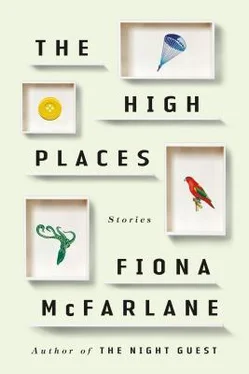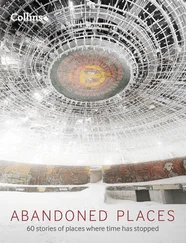Henry stood. ‘Let’s go,’ he said, and she followed him out, her hand on his back, and he let it stay there. He didn’t look at Arthur.
‘What’s the rush?’ Kath asked, and he pulled her by the hand into the darkness of a stand of trees. This whole part of Sydney had once been a swamp, and then an abattoir. There was rot and filth under all of it. Kath’s lipstick tasted chalky and sweet, and he felt with hectic hands under her coat; but she pushed him away.
‘Henry,’ she said, and he stopped. Her face was as pale as the bark of the gum behind her. ‘I could use some money,’ she said. ‘Just a loan.’
He waited for the shouting of the crowd inside the racetrack to subside, and then he asked, ‘How much?’
‘I could use a hundred,’ she said. He didn’t answer. ‘That’s nothing to you. That’s a hundredth of what you won.’
Henry reached out for her coat again, and this time she unbuttoned it for him. She was as thin as she had always been underneath it, and she shook like an arrow. She didn’t raise her face or body into his, and kept her arms behind her, wrapped against the trunk, so that he felt, kissing her, as if he were only pressed to a tree that had once had a girl inside it. But her mouth moved. She was willing. It was her being willing that made him stop.
He stepped away from the girl and the tree. He took all the notes he had in his wallet and passed them to Kath, who accepted them without looking.
‘Thank you,’ she said. She began to button her coat.
Henry walked out to the part of the street that was most illuminated by the floodlights of the racetrack. The invisible cloak still lay across his shoulders; it was heavier in the light. He shook it off and walked home to his mother.
His lucky mother, who was waiting now for Arthur with a lamp in her bedroom window.
What a terrible thing at a time like this: to own a house, and the trees around it. Janet sat rigid in her narrow seat. The plane lifted from the city and her house fell away, consumed by the other houses. Janet worried about her own particular garden and her emptied refrigerator and her lamps that had been timed to come on automatically at six.
‘Is six too early? Too obviously a timer, do you think?’ asked Murray. Janet was disturbed by this marital clairvoyance, and this was a new feeling, very recent. It had to do, she thought, with seeing the Andersons again. She took Murray’s hand and together the Dwyers leaned toward the small window and watched as the horizon lost authority. When the attendants came with trolleys they would know they were safe, but until then they held hands as they tilted into the sky.
During the flight Janet allowed herself to remember her fear of the Andersons. She had forgotten this fear — or placed it aside — during the flurry of preparation. There had been an efficient period of To Do lists and of telling people, coyly, that they were ‘meeting old friends in Greece’. Now, necessarily idle on the plane, Janet recalled the Andersons’ sophistication; the decisiveness of their actions, which had always been without tremor or negotiation; the fact of their being American, which placed them at the centre of the world. Suspended above the revolving deserts of the Middle East, she feared the Andersons, who were from ‘good families’, however that might be understood — this was clear because they used to mention expensive New England schools and exotic family holidays. Or Amy Anderson mentioned these things on behalf of herself and Eric with an air of begrudging tenderness, as if obliged to give up a shameful but pleasant secret, and this fascinated Janet, who’d grown up in an asbestos house owned by the Australian government.
Murray would never say he feared the Andersons, though in his anxious way that’s what he meant by ‘Is six too early?’ And Janet worried about him coming into daily contact with a man like Eric Anderson — what that might do to her husband’s self-esteem, given that Eric, since they’d met him, had gone on to an illustrious academic career and Murray’s contribution had been so small, though very solid. And to be seeing them again in Greece of all countries, in an old place that mattered, among the ancient terrors of history. The best thing was to be afraid along with Murray, to retain that sense of unity; later they could rally, once they’d been reassured by the goodness of Greek food and the number of people who spoke English. So Janet nurtured her fear over peanuts and warm washcloths, and pressed her leg against Murray’s, and together they watched the same in-flight movies and walked up and down the night-time aisles of the plane in their compression socks, treading softly over the slipped blankets of other passengers.
In this way they flew to Greece, as if that were an easy thing to do: to board a plane in Sydney, spend a few hours in Hong Kong and then in London, and finally to arrive in Athens. They stepped out of the airport terminal and were surrounded by offers of help and information; they’d expected this and made their way to the official taxi rank with resolute faces. Murray held a piece of paper with the address of their apartment on it in Greek letters; he handed this over to the taxi driver like a man entrusted with the delivery of a sacred object. The driver understood. The apartment was, it seemed, a real place in a real city.
The apartment had been Amy’s idea. Both couples would find one and spend the week as if they really lived in Athens. They would be neighbours, they would cook experimentally with market vegetables, they would carry keys and not hotel swipe cards. Here were some vacation rental websites Amy had looked at. Here was the apartment the Andersons were booking, a large white space with a roof terrace. Amy was sure Janet could find something similar nearby. Janet was less sure. She preferred the idea of a hotel. The apartments on Amy’s websites were too expensive, or unavailable. Her son Damian offered to help. This wonderful trip to Greece, said Damian. He’d talked her into it. Damian was an experienced traveller — he’d been to places like Lebanon and Cuba — and he would help them. Now he worked for a law firm in London, and they would visit him after Athens. They would visit Damian in London and take him to the town Murray and Janet had lived in all those years ago, when Murray was a graduate student and they were newly married. They had met the Andersons in those days, in that town.
Damian found something not very close, but not so very far away from the Andersons’ apartment: a student sublet with too many stairs, crowded with plastic furniture. It was cheaper than it needed to be, but it was something and it was somewhere; it was their apartment in Greece. And Damian had spent time finding it. And the relief Janet felt, despite the furniture and the view of TV aerials, countered, briefly, almost all of her disquiet. Murray sent a deposit. Then came an email of apology from Amy: their apartment had fallen through, last-minute, a shame, hotel after all, so disappointing. Here was the hotel address — the website — the tasteful lobby — the Acropolis view. The computer screen gave Athens to Janet and Murray, and they peered at it from the safety of their house in Sydney. They saw the white buildings, cement towers among the hills, the brown smudge low in the sky, the many roads, the temple high above. A sensation of having made a terrible mistake, of having sunk into something disastrous. But they would survive this city. In their apartment.
‘We’ll save on breakfast with our own kitchen,’ said Murray. ‘Make tea of a night.’
And Janet was reassured; they both were. When they entered the apartment — finally, having crossed the world to find themselves in it — they both looked for a kettle among the furniture. There it sat by the stove. It restored their confidence. They carried their suitcases into the small bedroom and lay on the student bed. Their limbs pressed into the sheets as if they were made of metal. Janet wanted to phone Damian at once but they fell irresistibly asleep, and when they woke later that afternoon it was time to meet the Andersons at their hotel.
Читать дальше












